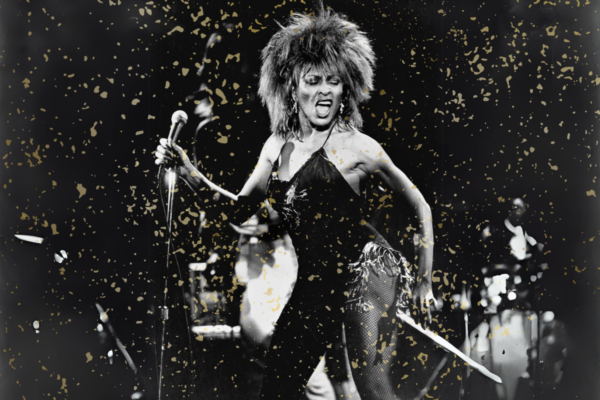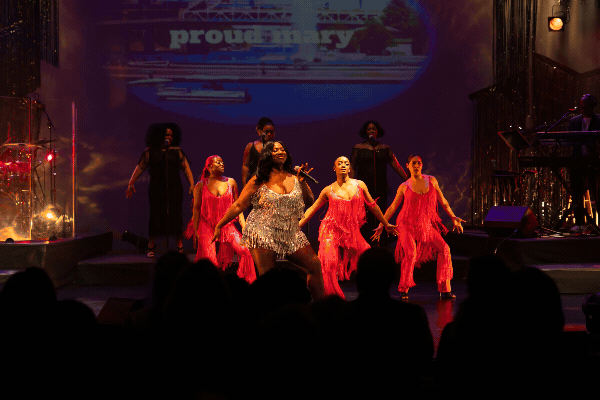To Experience Tina is to Witness Fire

An excerpt from the curtain sermon for Simply the Best on March 16, 2024
Tonight, we honor the legacy of the Queen of Rock n Roll. Acid Queen. Anna Mae, if ya know. Ms. Tina Turner was born on November 26, 1939 in Tennessee where she spent part of her childhood picking cotton on a farm in Nutbush, and sang in the choir of the Spring Hill Baptist Church. Ms. Tina leaned on spirituality throughout her life. She was a devout Buddhist rocker for more than 50 years.
In an interview with the Harvard Business Review in 2021 Ms. Tina said, “Of everything I’ve done to succeed as an artist, spirituality has had the greatest influence.” In 1984 she told the LA Times, “You take away the bondage, the problems, the hang-ups, the egos, and I can fly. I can laugh, I can dance, I can sing, and I don’t grow tired. Freedom. That’s my motivation.”
In one of Buddha’s teachings “The Fire Sermon” he explains to find freedom, we must release our attachment to desires. Our cravings and desires cause suffering, just like a spreading fire destroys everything. But fire can also purify and transform. Indigenous practices use fire to protect the land, while the burning bush transformed Moses into a leader for his people.
And the Proud Mary keeps on burnin’.

When recounting Ms. Tina’s time with the Ike and Tina Turner Revue, Cultural Anthropologist, Maureen Mohon wrote, “she and the Ikettes sang full throttle and performed rapid-fire dance steps; those whirling arms, swinging hair and fringed mini dresses. Tina wasn’t afraid to be sexy and she wasn’t afraid to sweat.”
Tennessee History Professor Dr. Elwood Watson proclaimed, “She unabashedly screamed, shouted, kicked, and thunderously belted out vocals — all of which cultivated a fierce, brash aura that provided rock and roll one of its most distinctive sounds. Tina Turner brought an uncompromised strand of black Southern music, the sound of the Chitlin’ Circuit itself.”
“Her voice was a spiritual successor to that of Big Mama Thornton, Sister Rosetta Tharpe, LaVern Baker, and many other Black women who laid the foundations of rock & roll,” adds writer Lester Fabian Braithwaite.
And, yes, she went through fire.
“She was the first star to talk aloud about domestic violence, to insist on it as part of her story,” said Rob Sheffield of Rolling Stone. “Until she came along, the idiom ‘domestic violence’ wasn’t even part of the language.”
They say ‘Hell hath no fury like a woman scorned’ but I say move out the way of a badass on fire, reclaiming her time and insisting on living her peace.
To experience Tina Tuner is to witness fire, the crackling, sputtering, snapping, roaring blaze, popping, sizzling, the crisp snip-snap-whoosh, a ceremonial cleansing on stage sending a whirling smoke signal up to the heavens, inviting us to let go, to shake a tail feather, to join the disco inferno, to get free.
Rob Sheffield summed up Ms. Tina’s legacy by acknowledging that, “Nothing could ever scare the fire out of her voice, which carried the whole story of American music in it.”

Additional Resources:
Podcasts
- National Museum of African American History & Culture x NPR Music – Black Diamond Queens: A Conversation Between Maureen Mahon And Ann Powers
- Tina Turner’s Happy Ending for NPR
Book
- Black Diamond Queens: African American Women and Rock and Roll by Maureen Mahon for The Guardian
Articles
- Tina Turner, Queen of Rock ‘n’ Roll, Left an Indelible Mark on Music History by Christopher Parker for Smithsonian Magazine
- Tina Turner, Magnetic Singer of Explosive Power, Is Dead at 83 by William Grimes for The New York Times
Photo Credits: Delaney Greenberg, Mingsi Ma, Randall Coleman
